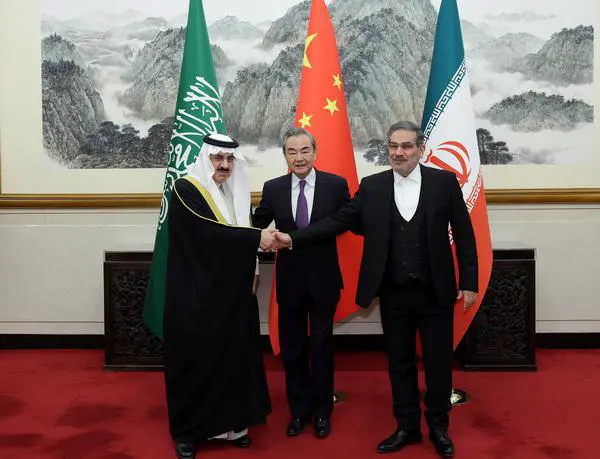APD Hannah
On the evening of March 10th, Beijing time, the People's Republic of China, the Kingdom of Saudi Arabia, and the Islamic Republic of Iran issued a tripartite joint statement in Beijing, announcing that Saudi Arabia and Iran have reached an agreement, including agreeing to resume diplomatic relations between the two sides, reopening their embassies and representative offices within up to two months, arranging for the exchange of ambassadors, and exploring ways to strengthen bilateral relations. This statement has a crucial impact on strengthening international and regional peace and security, adding a peaceful energy to the world.
After a 5-day dialogue, Iran and Saudi Arabia resumed diplomatic relations under the mediation of China. Wang Yi, member of the Political Bureau of the CPC Central Committee and director of the Central Foreign Affairs Office, described the agreement as a victory for dialogue and peace, adding that Beijing will continue to play a constructive role in resolving thorny global issues.
The two sides appreciate and thank China for its positive role in promoting the resumption of diplomatic relations between the two sides. Saudi officials said that the initiative proposed by Chinese leaders adheres to the principle of good neighborliness and friendship, and promotes regional and world security and stability. Iranian officials said that China has played a constructive role in supporting other countries in expanding cooperation and developing relations.
Iraq, Oman, Lebanon, the United Arab Emirates, Qatar, Türkiye, Bahrain and other countries welcomed the restoration of diplomatic relations between Saudi Arabia and Iran. "On the whole, we welcome any efforts that will help end the war in Yemen and ease tensions in the Middle East," said White House National Security Council spokesman Kirby
Subsequently, UN Secretary General Guterres also issued a statement saying that he welcomed the resumption of diplomatic relations between Saudi Arabia and Iran and thanked China for facilitating dialogue. Guterres expressed that Saudi Arabia's good neighborly friendship with Iran helps promote stability in the Gulf region.
Jonathan Fulton, an expert on Middle East issues at the Atlantic Council, a US think tank, said in an interview with the New York Times that China and the United States have different approaches in the Middle East. The United States uses one country to balance another, which limits its ability to work in foreign affairs, while China has established diplomatic relations with both of the Gulf powers, which is a "smart approach".
For many years, Saudi Arabia and Iran can be called "old enemies" of the Middle East. In January 2016, Saudi Arabia executed a Shiite Muslim cleric on charges of engaging in terrorist activities, and the Saudi Embassy in Tehran, Iran, was attacked. Saudi Arabia severed diplomatic relations with Iran. After that, the two countries conducted multiple rounds of negotiations, and although there was an intention to ease the relationship, there was never a substantive breakthrough.
Without any warning, China has quietly facilitated the "Great Reconciliation of the Century", which has aroused heated discussion throughout the world.
"The Iran-Saudi Arabia agreement heralds a sharp increase in China's influence in the region dominated by the United States for a long time," said Dr. Shi Wen, a professor at Uppsala University in Sweden. "After the Beijing dialogue, Iran and Saudi Arabia agreed to resume diplomatic relations, not only demonstrating China's diplomatic capabilities, but also indicating that the era of the United States dominating Middle East politics has officially ended."
Cheng Xizhong, a distinguished professor at Southwest University of Political Science and Law and a special commentator at Asia Pacific Daily, commented that under the careful mediation of China, two important countries in the Middle East region are also long-standing competitors. Saudi Arabia and Iran are about to end years of tense relations and achieve the normalization of bilateral diplomatic relations, which is not only a great benefit for regional stability but also for world peace.
This major event has three main points of view: First, the people of the world expect peace rather than confrontation. After the issuance of the joint statement of China, Saudi Arabia and Iraq, the world cheered, especially the unanimous welcome of countries in Iraq, the United Arab Emirates, Türkiye and other regions. The Secretary General of the United Nations Guterres issued a statement through his spokesman, believing that good neighborly friendship between Saudi Arabia and Iraq is conducive to promoting stability in the Gulf region.
Secondly, China is an important force leading world peace. This time, turning hostility into friendship is a vivid manifestation of China's courage to assume responsibility and take an active role in international affairs. As Foreign Minister Bilavar of Pakistan stated, "it demonstrates China's leadership image on the international stage, a leadership image that focuses on unity rather than differentiation, a leadership image that strives to promote win-win cooperation, and a leadership image that encourages resolving differences rather than increasing differences.".
Third, the division and rule of the United States is unpopular. For decades, the United States has been creating conflicts between countries in the Middle East, provoking war from time to time. From 1948 to 1982, the United States provoked five wars in the Middle East, followed by the Gulf War, the Iraq War, and the Syrian War. Now, it occasionally carries out air strikes against targets within Iran, and the people of the Middle East region have been ravaged by war. In the Middle East region, the United States mainly has two allies, Israel and Saudi Arabia. Currently, the normalization of relations between Saudi Arabia, an ally of the United States, and Iran, an enemy of the United States, reflects the strong desire of countries and people in the Middle East to pursue independence, peace, and stability.
(APD)
 简体中文
简体中文

